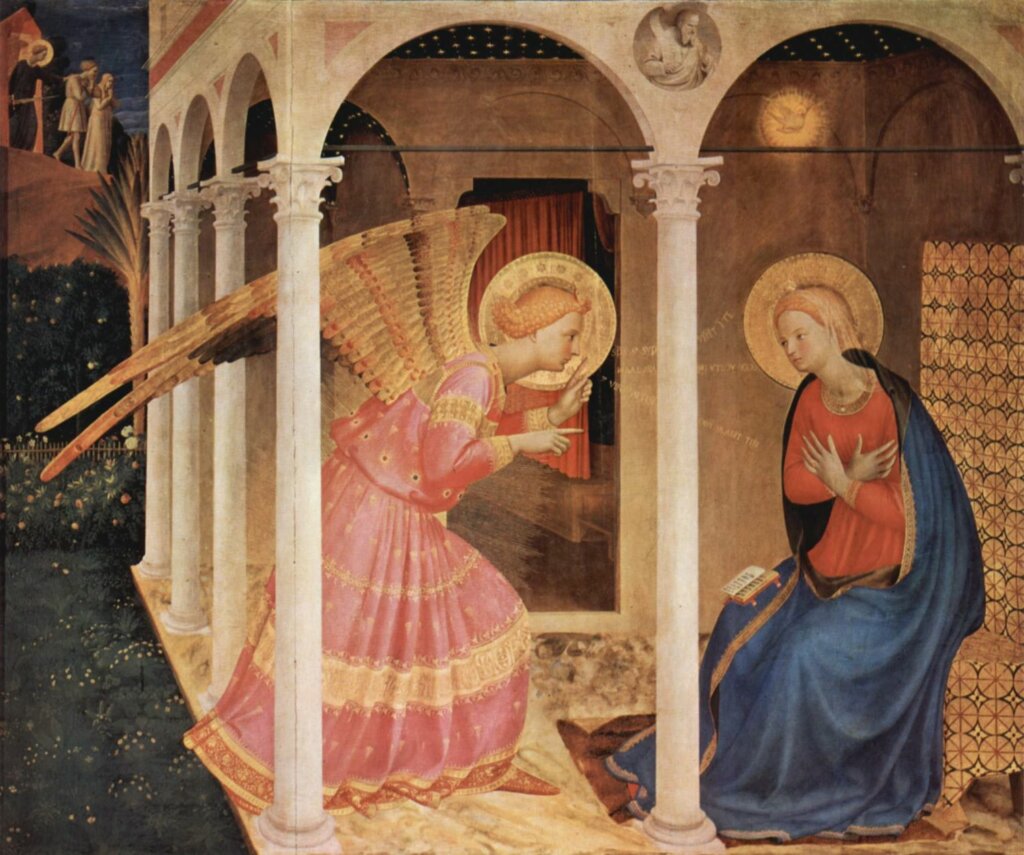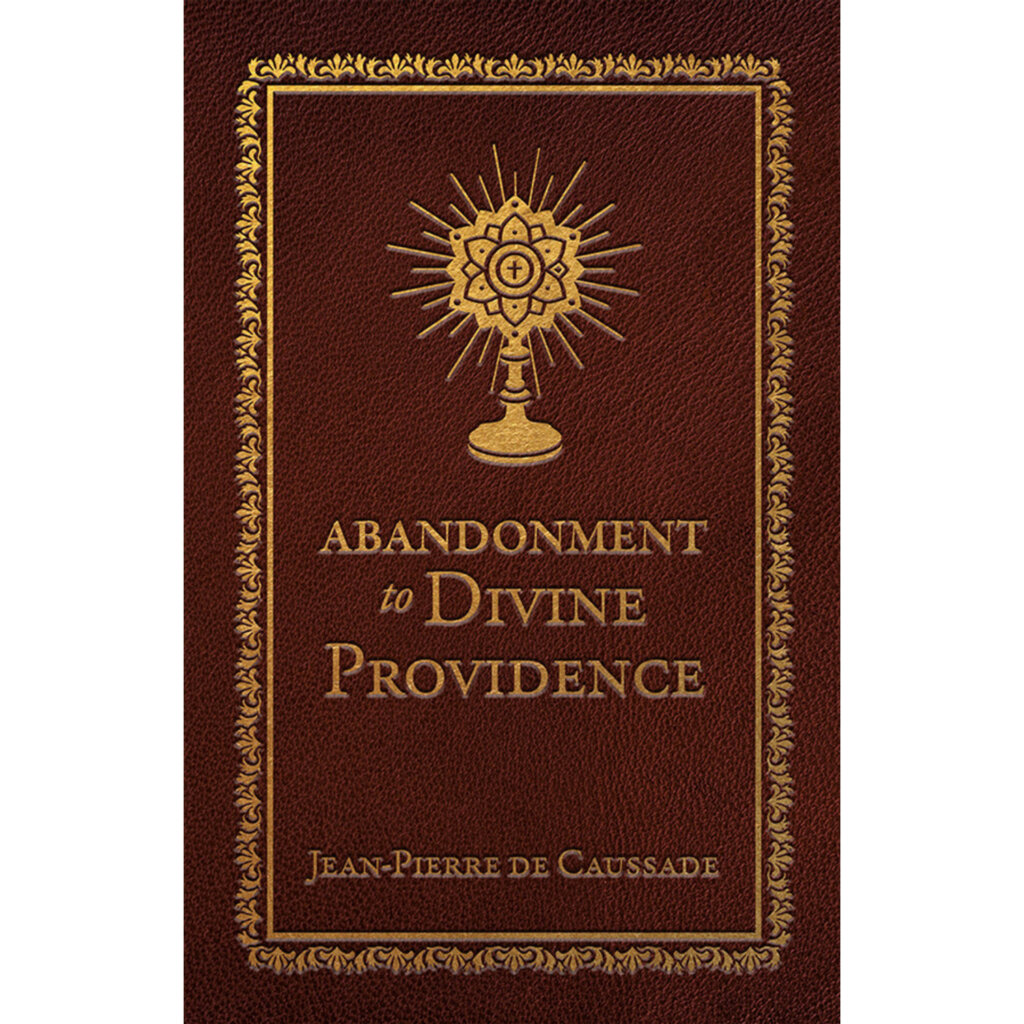
If we knew how to leave God’s divine hand free to act we should attain the most eminent perfection.
Fr. Jean-Pierre de Caussade, Abandonment to Divine Providence
Arrow prayers are short prayers that only take a few seconds to pray—they are “shot” up to God in a moment. They help to penetrate darkness or fear and direct our thoughts quickly to God, especially when we feel particularly weak, vulnerable, or scared. The devil hates these kinds of prayers because they reveal the faith and hope of the one praying them.
Anything can become an arrow prayer, such as the words “Thy Will be done,” which we know are the words Jesus Christ gave us to pray in the Our Father.
In fact, it is those same four words—Thy will be done—that are so crucial to the concept of “trustful surrender” or “self-abandonment to God’s will.” This concept is the subject of a treatise by Fr. Jean-Pierre de Caussade published under the title Abandonment to Divine Providence.
Fr. Caussade died in 1751 at the age of seventy-six. He was not well-known in his lifetime. But many of those who did know him were the nuns of the Order of the Visitation in France, where he was their spiritual director for almost ten years. In fact, the treatise was compiled after his death and was a mixture of notes from his conferences with the Sisters and letters he wrote to many of them, including the mother superior of the order.
In the later years of his life, Fr. de Caussade’s eyesight diminished until he eventually became blind. One of the nuns said that witnessing the degradation of his sight and then his blindness was an inspiration to those around him: he “bore it with courageous fortitude and in the spirit of his own great principle of self-abandonment to the Will of God” (taken from “A Biographical Note” in Self-Abandonment to Divine Providence, another edition of the same work).
Fr. Caussade’s spiritual teaching derived heavily from two “pure” sources: St. Francis de Sales and St. John of the Cross. (Amazingly, the themes he developed are also similar in nature to another saint whose writings did not appear until after Caussade had died, and to whom Caussade had never been exposed: St. Thérèse of Lisieux). The consistent themes of these spiritual masters give testament to the importance of what they were conveying and of what they have passed on to so many seeking an intimate relationship with God. Fr. Caussade often told those he directed to use “ejaculations in moments of spiritual weakness.”

In any kind of physical exercise in strength, we grow stronger through work and persistence, and without consistent exercise, we can also grow weaker. So it is with our spiritual muscles. It can be helpful to remember that the devil does not want us to grow in our spiritual lives. The devil desires atrophy, not strength, because his work is easier that way.
Arrow prayers are tools we can use regularly to build spiritual strength.
The following are six ejaculations that Fr. de Caussade used in his many conferences (and in his writings to particular sisters who were under his direction). These prayers were meant as acts of abandonment to be said in a moment—and they can be powerful weapons for all of us to pull out of our quiver in the fight against the evil one.
1. “O God, I abandon myself to You.”
There is so much substance behind this powerful prayer. When we pray these words, we are echoing the words Our Lord asked us to pray in the Our Father: “Thy will be done.” It is not hard to understand why a sincere act of abandonment would be offensive to the devil, who said, “I will not serve.”
O God, I abandon myself to You. I remember a priest once telling me in the confessional that we are only truly happy when we are doing God’s will. It is why he suggested that at the end of any petitionary prayer, we add the words “Thy Will be done.” The more we say those words, the more they make sense to us in our lives, and the more we desire to seek God’s will. Fr. Caussade said something similar when he explained:
If the work of our sanctification presents us with difficulties that appear insurmountable, it is because we do not look at it in the right way. In reality, holiness consists in one thing alone, namely, fidelity to God’s plan.
Abandonment To Divine Providence
2. “My desires, O God, are your desires; both in the present and for as long as it pleases you.”
Fr. Caussade explained that we should desire only God’s will and bring to mind often in the interior of our heart that God’s desires for us should be our desires:
There is nothing better or more simple than this; nothing more is needed to call forth His powerful help. Hold steadily to these practices and interior inclinations. God will do the rest without your perceiving it.
Abandonment to Divine Providence

At one point in the book, Fr. Caussade speaks about the Old Testament figure of Job and suggests that we recall in moments of suffering his words in Job 1:21: “The Lord hath given; the Lord hath taken away; blessed be the name of the Lord.” He goes on to say that faith is never unhappy, even when the senses are in a state of desolation. This is an interesting way to describe faith because it takes it out of the realm of the emotions. Offering this kind of arrow prayer or act of abandonment is helpful because it reminds us to pray to want what God wants for us, regardless of how we are feeling in a given moment or season. It is easy to get caught up in our own needs and desires and assume they are the same as what Our Lord desires.
3. “God wills it! May God be blessed for all things.”
It is not difficult to say these words when all is well. It is a much harder thing to do when we meet with struggles, frustrations, or hardships. Yet Fr. de Caussade explained to one of the nuns who was under his spiritual direction that it was especially in the hard and more difficult struggles in this life that we should bless God:
“God wills it! May God be blessed for all things.” What comfort there is in that saying! Let us, my dear daughter, make use of it whenever our delicate spiritual stomachs reveal their weakness and their difficulty in dealing with food not to their liking. By this simple recipe, bitterness is changed into sweetness and we find everything good and palatable.
Abandonment To Divine Providence
One aspect of Caussade’s teaching about abandonment is important to remember here. It is easy to think “I just need to have a better attitude—I need to think more positively.” Yet he is not preaching a “positive attitude.” In Abandonment to Divine Providence, Fr. Caussade often mentions that it is God’s will that we should seek, not necessarily His consolation. In ALL things, may God be blessed. Even when we are in a place of discouragement, we can lean on the Lord in that moment. We don’t have to think it away with happy thoughts, but we need to know that God is with us in sorrow and joy and in whatever we are going through.
Many of us know this as one of the more difficult aspects of the spiritual life. Fr. Caussade, speaking specifically about temptations and sufferings, expressed the following:
The majority of people who are not very far advanced in the ways of God and the interior life esteem only the operations of sweet and sensible grace. But it is certain that the most humiliating, distressing, and crucifying workings of grace are the most effective in purifying the soul and in uniting it intimately with God. And so the masters of the spiritual life agree in saying that we make greater progress by suffering than by action.
Abandonment to Divine Providence
4. “Dominus est! (It is the Lord!)”
God is in the present moment, if only we could see Him there. Most of us can more easily appreciate that God is in the “big” events of our lives—in the birth of a child or grandchild, the experience of the death of someone close to us, or an answered prayer. Yet, it is often more difficult for us to recognize God in the little things that happen every day. In the making of a meal, in the drive to work, in those little daily events that pass unnoticed.

Yet Fr. Caussade encourages us to remember that God is in the small moments as well as the big ones!
Could we pierce the veil and were we vigilant and attentive, God would reveal Himself continuously to us and we should rejoice in His action in everything that happens to us. At every occurrence, we should say: Dominus est! It is the Lord, and in all circumstances, we should find a gift from God.
Abandonment to Divine Providence
We don’t encounter God’s will in the past, because the past is gone, and we don’t encounter God’s will in the future, because the future does not yet exist.
God reveals His will to us only in the present moment of our existence, accompanied by the specific graces we need in order to conform ourselves to it. This is the only time we’re given to follow His lead.
Good Catholic series Thy Will Be Done
Intentional recollection of God’s presence, which surrounds and sustains us, is a great aid in training our minds to seek God’s will for us in the present moment. This recollection is called “practicing the presence of God.” To do this, we simply turn our mental gaze to the thought of God’s presence (as if He were in the room with us, or sitting next to us, or better yet, dwelling within our souls through sanctifying grace), and speak to Him as we complete the tasks of the day.
The divine will is a deep abyss of which the present moment is the entrance, if you plunge into this abyss you will find it infinitely more vast than your desires.
Abandonment to Divine Providence
“Dominus est! It is the Lord.”
5. “For love of You, with all my heart I pardon the person who is the cause of my suffering.”
It is easy to talk about surrender in theory, but in practice, it is more difficult. I find this to be true especially when I feel hurt by someone’s words or actions. My emotions get the best of me and can get in the way of a forgiving heart. Yet Fr. de Caussade told those under his direction that when we are suffering because of the actions of another person, we can offer our forgiveness for the love of God. This helps us not only to seek a spirit of forgiveness for the other person but also to remember that we too are often in need of forgiveness ourselves.
Have no doubt at all that your self-abandonment, coming at the time of this apparent absence of goodwill, will tend more forcibly to purify and increase that imperceptible goodwill to be found in you.
Abandonment To Divine Providence
6. “Yes, heavenly Father, and always, yes!”
In the Good Catholic series Thy Will Be Done, Fr. Miller explains how an understanding of the sovereignty of God should be an immense help to us spiritually if we would contemplate the implications. He says that if we can remember three attributes of God—His omnipotence, goodness, and omniscience (God is all-powerful, all-good, and all-knowing), then we should know that God wants nothing but good for us—and not just good but “the best of goods.” If we consider this truth—it brings with it a certain consolation, for if we believe that God is all-powerful, all-knowing, and all-good, then we should also believe that all things work together for good in our life. If God desires my good, then whatever God desires I should also desire. Fr. de Caussade explains it this way:
For such is true and complete self-abandonment, that binds God to take charge of everything in regard to those who abandon everything to Him, thus paying homage to His sovereign dominion, His power, His wisdom, His goodness, His mercy and His infinite perfections. Amen. Amen.
Abandonment to Divine Providence
This “yes,” said with the whole heart, is the practice of self-abandonment. “It contains in its brevity the greatest things, and expresses the greatest sacrifices.”

Acts of Surrender
Arrow prayers are interior acts of surrender (they can be prayed aloud as well) that allow us to be in communication with Our Lord throughout the day, whether we feel joy, sorrow, aridity, or no emotion at all. They are ways to express our devotion to God’s “holy wishes” for our lives, which is why they are such a frustration to the devil—he can’t stand a soul that is totally abandoned to God’s will. Fill your quiver with these simple, powerful prayers and “shoot” them up to God regularly, so that each day can be a gift of surrender and trust in Him.




![The O Antiphons: An Ancient Cry For A Present Christ [Listen and Read]](https://www.goodcatholic.com/wp-content/uploads/2022/12/the-o-antiphons-ancient-cry-present-christ.jpg)
![Watch A Sneak Peek Of “Overcoming Deadly Sin” [Video]](https://www.goodcatholic.com/wp-content/uploads/2021/05/sneak-peek-overcoming-deadly-sin-video.jpeg)
